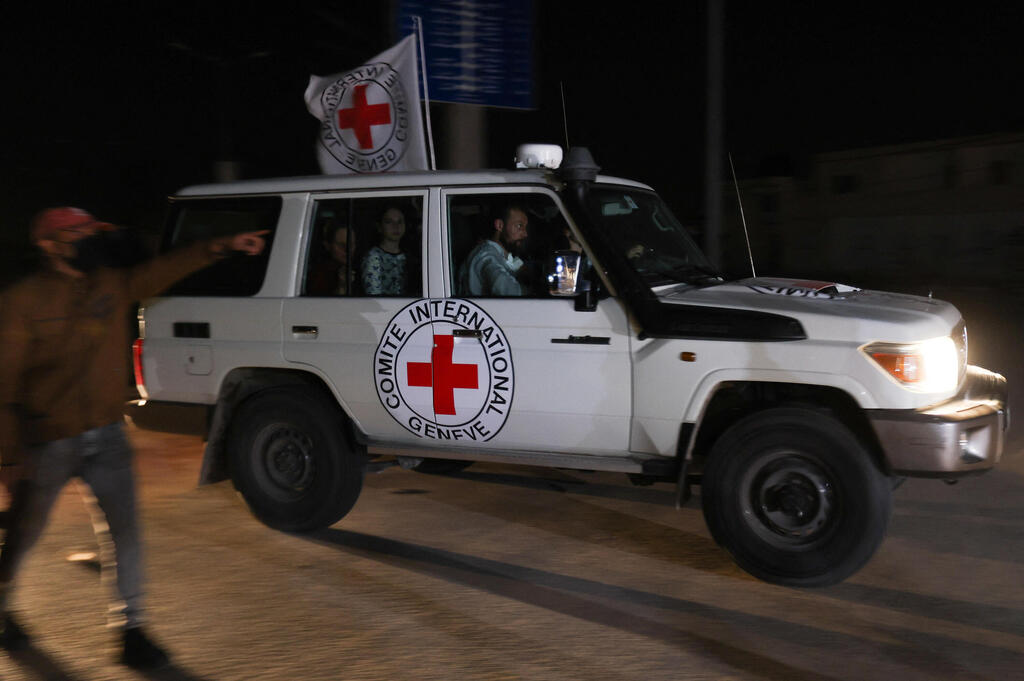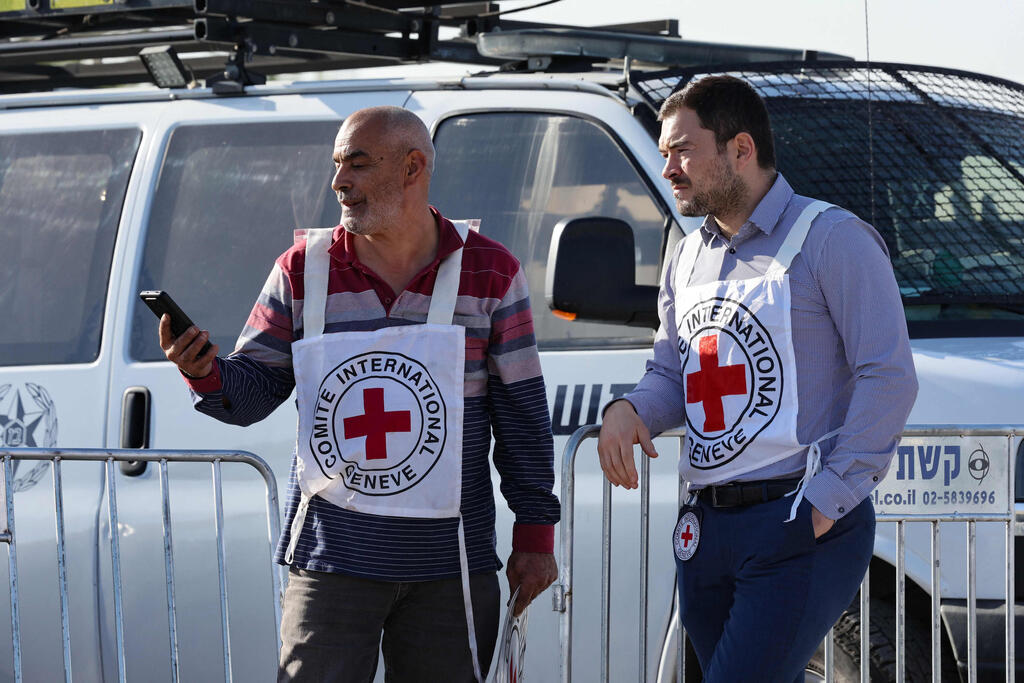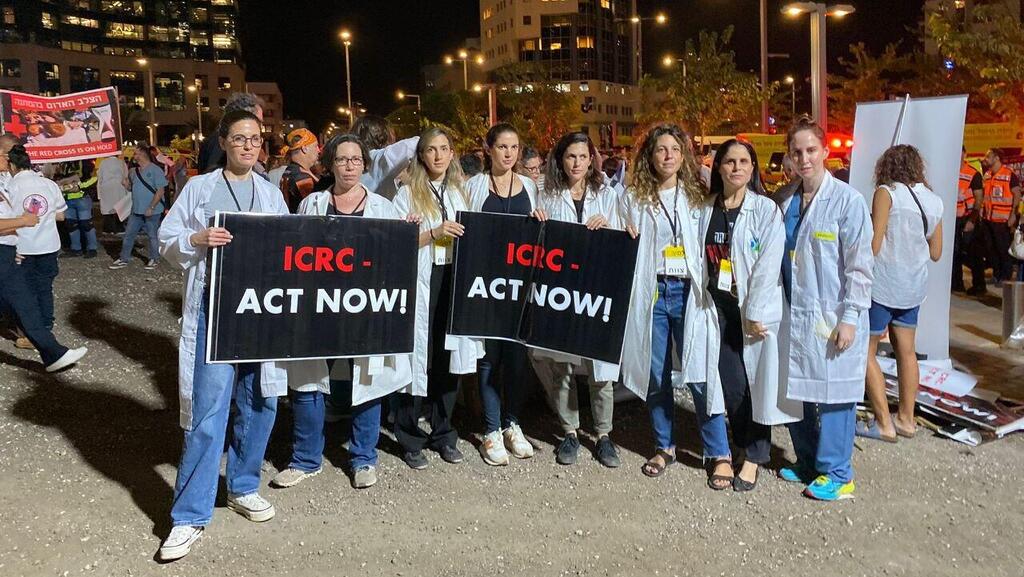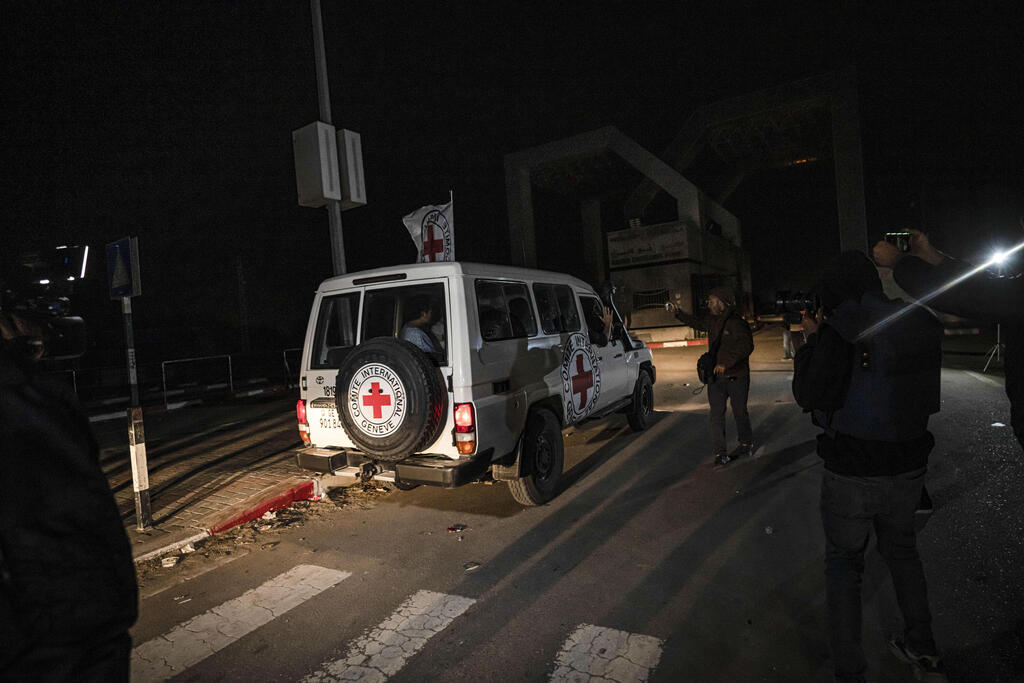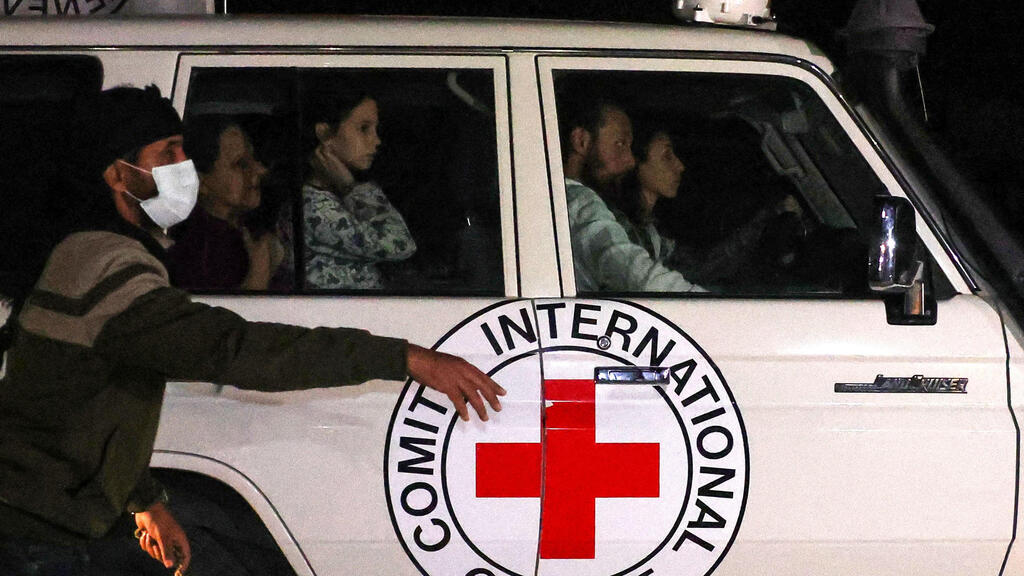In recent times, many in Israel have criticized the International Committee of the Red Cross (ICRC) organization for not insisting on visiting Israeli captives in the Gaza Strip. However, the truth is that this organization is doing very important work. Its personnel, who come to Israel, Gaza, and other places all over the world, are the ones who deliver Israeli captives out of combat zones in their off-road vehicles and bring them to secure locations.
More stories:
They’re also the ones who accompany the release of Palestinian terrorists from Israeli prisons, which is a central aspect of the hostage deal. You may not like them, but the truth is that you can’t do anything without them. This is the only organization that Hamas trusts.
In recent days, we’ve seen how the organization's personnel travel in white vehicles adorned with the flags of the International Red Cross. According to the Foreign Ministry, the Red Cross is seen in a more positive light among other humanitarian organizations.
"We see what they’re doing now in their aid to bring about the release of Israeli captives. Could they have done more to aid them? I don't think they could have done much more. It's part of the political give-and-take," said a senior official in the Foreign Ministry.
What is less liked in Israel is the fact that in Red Cross statements, they always seek to appear neutral toward external parties, but will talk more about Israel's commitments regarding warfare and less about Hamas's commitments on the same topic.
Nevertheless, senior officials in Israel admit that, overall, the Red Cross is not anti-Israeli, and its personnel also do practical things: "They’re the ones bringing the captives back. They’re the ones trying to establish a field hospital in Gaza based on requests from Israel and the international community. So, yes, the organization's statements can be obtuse at times, but it must be said: there are many organizations that are much worse."
Pascal Houndt, director of the ICRC crisis response team and the one who first met the Israeli captives in the Gaza Strip before their return, recounted that "the captives’ initial reactions were very moving, as one can imagine. They were held for weeks, separated from their families. Just seeing the symbol of the Red Cross, we could see they felt hope. Our teams took them, reassured them, and accompanied them throughout the journey until their arrival at Egypt’s Rafah border crossing."
"We did everything to calm them," Houndt added. "There was a doctor with our team, we had eight representatives and four jeeps. I think what was most important in those moments was the genuine closeness and human contact we could provide to comfort them and say that everything is okay.
“They were together with the Red Cross, and they returned home. We focused on that. We didn't have time to investigate or discuss what their conditions were before. Professionals will take care of that. But in that moment of extreme tension and crisis, it's important that as human beings, we can show a bit of empathy and calm them down."
Houndt told of the first encounter with the released captives: "It was a very emotional moment for the captives. A profound sense of freedom and hope, when they realized they were going home. One can only imagine what goes through the minds of women and children who suddenly see the Red Cross symbol and understand that they will soon reunite with their families. It's an amazing moment. We, the Red Cross personnel, were almost in tears at that moment. It was a kind gesture of humanity. It was an emotionally charged moment for all of us."
Israel's communication with the Red Cross is generally positive, and its personnel hold a diplomatic status in the country. Criticism was sounded in Israel against the organization that distanced itself from the agreement regarding the captives, which included a specific clause on visits by the Red Cross to them and a commitment to provide the held individuals with necessary medications.
The Red Cross clarified that it did not know of such a clause and would do as it was asked. Hamas rushed to distance itself from this clause. Israel continues to insist that the clause exists, saying that Qatar, Egypt, and the U.S. vouch for the agreement and the mentioned clause.
Past experiences teach that the Red Cross is not authorized to visit captives. Gilad Shalit did not see Red Cross personnel during his 1,941 days in captivity, but when he was released, he was received by Red Cross personnel.
Operating under the Geneva Conventions
The International Committee of the Red Cross (ICRC) is a neutral, impartial, and independent organization. Its mandate to protect and assist victims of armed conflicts is granted by states, the four Geneva Conventions of 1949, and their additional protocols from 1977—following the path of the first Geneva Convention of 1864.
The ICRC’s mandate and legal status distinguish it from intergovernmental agencies, such as UN organizations, and non-governmental organizations. In most countries where it operates, the ICRC signs delegation agreements with local authorities. These agreements, subject to international law, grant the ICRC special rights and immunities generally reserved for intergovernmental organizations.
The ICRC has been operating in Israel and the surrounding area since 1948 and has maintained a permanent presence in the country since 1967. Its primary activity focuses on the protected Palestinian civilian population according to international humanitarian law, emphasizing its nature as a humanitarian, neutral, non-political, and independent organization.
ICRC representatives, deployed throughout Israel, the Golan Heights, the West Bank, and Gaza, work to promote relationships that respect the civilian population, aiming to assist them in leading normal lives as much as possible.
Thanks to its presence in the region, the ICRC can monitor general compliance with international humanitarian law and highlight the need for the development of new regulations. The Red Cross reminds all involved parties in conflicts of the limitations imposed on them by the laws of war, particularly the strict prohibition of deliberate attacks against civilians.
Collaboration with Magen David Adom (MDA) and the Palestinian Red Crescent Society (PRCS)
Israel’s MDA emergency service and the Palestinian Red Crescent Society (PRCS) are at the forefront of ICRC's priorities. This collaboration is intended to support strengthening the organization’s capabilities to achieve its humanitarian goals and respond to emergency situations, focusing on emergency medical services and disaster management.
In the case of violence or armed conflicts, the ICRC’s role is to assist the victims and ensure full compliance with international humanitarian law as long as the conflict persists. Among its objectives are ensuring the rights of victims in the conflict, providing humanitarian and medical assistance, reducing the dangers faced by civilians, facilitating and preserving contact with families, and locating missing persons.
One of the core ICRC’s activities is the restoration and preservation of contact between separated family members as a result of intense conflicts and the search for missing persons. Through its headquarters in Geneva and its missions in the Middle East and around the world, the organization works to gather information about Israeli civilians and soldiers whose fate is unknown, all while ensuring a continuous connection with their families.
The ICRC has made efforts to assist in the repatriation of prisoners, the wounded, and the bodies of IDF soldiers and Israeli civilians throughout its years of operation in the region.
What did the organization do for the Israeli captives?
The ICRC calls for immediate access to everyone captured in Hamas’ attack on October 7. This is so that we can check on their well-being and provide their loved ones with the necessary updates.
As a neutral and independent humanitarian organization, visiting individuals whose freedom has been taken away is a central part of the organization's work. The Red Cross works toward gaining access to all captives. The ICRC’s president met with Hamas leader Ismail Haniyeh in Qatar and requested permission to visit the captives.
Why doesn't the ICRC make its position clearer?
The ICRC emphasizes that based on their experience, the approach they take is the best way for them to influence the return of the hostages to their families. The ICRC has a long history of assisting in the release of captives worldwide.
They helped, for example, in returning the kidnapped girls, women, and children in places like Afghanistan, Colombia, Nigeria and Peru. They seek to do the same in Israel, and their personnel convey a message to Israeli captives’ families: "We haven’t stopped exerting pressure to help your loved ones from day one, and that won’t change."




